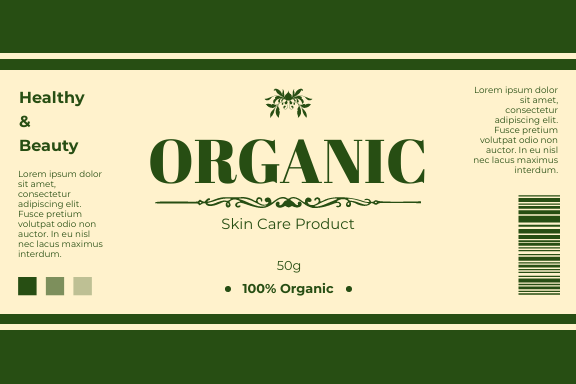Why Organic Skincare Products Are Best: Unveiling Nature’s Beauty Secrets
In recent years, there has been a significant shift in the beauty and wellness industry towards more natural and sustainable practices. This change is prominently seen in the rising popularity of organic skincare products.
Consumers are increasingly aware of the impact their choices have not only on their skin but also on the environment. It is important to know why this approach is becoming the preferred choice for many and unveils the secrets behind nature’s approach to beauty and skin health. Let us talk about it.
The Basics

Organic skincare products refers to products made from ingredients grown and processed under a strict code of cleanliness, with no use of synthetic pesticides, chemical fertilizers, or genetically modified organisms (GMOs). The distinction between organic, natural, and conventional skincare lies mainly in the ingredients’ sourcing and processing.
Understanding what qualifies as organic skincare is crucial for consumers who wish to make informed choices. The label implies that the product contains ingredients that are not only naturally sourced but also farmed and processed under rigorous standards. These standards vary from one region to another but generally include environmentally friendly practices and the prohibition of most synthetic substances.
What are the Benefits?

When it comes to skincare, organic products offer numerous benefits, starting with enhanced skin health and safety. These products lack the harsh chemicals found in many conventional skincare items, reducing the risk of skin irritations, allergies, and long-term health issues. Organic skincare provides a gentler alternative, especially beneficial for those with sensitive skin.
The methods used in cultivating and producing organic ingredients are typically more sustainable and eco-friendly. They tend to have a reduced carbon footprint compared to conventional farming and manufacturing processes, which often rely heavily on chemicals and fossil fuels.
Organic skincare products are also celebrated for their effectiveness and nutrient-rich formulas. These products often contain a higher concentration of active ingredients than their non-organic counterparts. Natural vitamins, minerals, and antioxidants in these ingredients can be more readily absorbed by the skin, offering enhanced nourishment and rejuvenation.
The Labels and Certifications

Navigating the world of organic skincare requires an understanding of the various labels and certifications that adorn these products. Certifications play a crucial role in skincare, ensuring that the products meet certain standards set by certifying bodies. These certifications are a testament to the purity and authenticity of the ingredients used.
Reading and understanding labels and certifications can sometimes be challenging, but it’s a crucial skill for anyone committed to using organic skincare. Labels often contain information about the percentage of organic ingredients, the absence of harmful chemicals, and the certification standards met.
Common certifications include USDA Organic, ECOCERT, and COSMOS Organic, each with its specific criteria and significance.
The Role of Ingredients
Organic skincare products are renowned for their rich composition of natural ingredients, each bringing specific benefits to skin health. Common ingredients include aloe vera, known for its soothing and hydrating properties, shea butter, which is highly nourishing and moisturizing, and various essential oils that offer everything from anti-inflammatory to rejuvenating effects.
The benefits of these specific ingredients are numerous. For instance, aloe vera can help soothe sunburn and reduce skin inflammation, while shea butter is excellent for deeply moisturizing dry skin. Essential oils like lavender or tea tree have been known for their therapeutic properties, aiding in skin repair and balancing skin oils.
These ingredients contribute significantly to skin health by providing essential nutrients directly from nature. They are often rich in vitamins, antioxidants, and minerals that are integral to maintaining healthy, resilient skin. By harnessing the power of these natural components, organic skincare can effectively address various skin concerns, from aging and dryness to acne and sensitivity, in a gentle yet effective manner.
Debunking the Myths
Despite its growing popularity, there are still several myths surrounding organic skincare. One common misconception is that organic products are less effective than conventional ones. However, this is far from the truth. Organic skincare products, with their high concentration of natural active ingredients, can be equally, if not more, effective in addressing skin concerns.
Another area of confusion is the cost versus value of organic skincare. While these products might sometimes be more expensive upfront, their value lies in the quality and purity of ingredients, which can lead to better skin health and fewer long-term skin issues. Moreover, the environmental benefits and ethical production processes often justify the higher price tag.
The shelf life and storage of organic products are also often misunderstood. While it’s true that organic skincare products, devoid of synthetic preservatives, may have a shorter shelf life, proper storage in cool, dry places can help preserve their efficacy for an adequate period. This aspect emphasizes the importance of using fresh products for the best skin benefits.
Integrating into Your Routine

Transitioning to an organic skincare routine can be a rewarding journey for your skin. Start by gradually introducing products into your regimen. This allows your skin to adapt and lets you gauge how different products work for your skin type. Incorporating organic products for various skin types is also crucial; for instance, those with oily skin might benefit from lightweight, non-comedogenic organic formulas.
Building a simple yet effective organic skincare routine doesn’t have to be complicated. Begin with the basics: a cleanser, moisturizer, and sunscreen. As you become more comfortable, you can introduce additional products like serums, toners, or masks tailored to your specific skin concerns. The key is to listen to your skin and choose products that nourish and support its natural balance.
The Bottom Line
Organic skincare offers a multitude of benefits, from improved skin health and safety to a lower environmental impact. Understanding the importance of labels and certifications, recognizing the role of natural ingredients, and debunking common myths are all crucial steps in embracing this approach.
